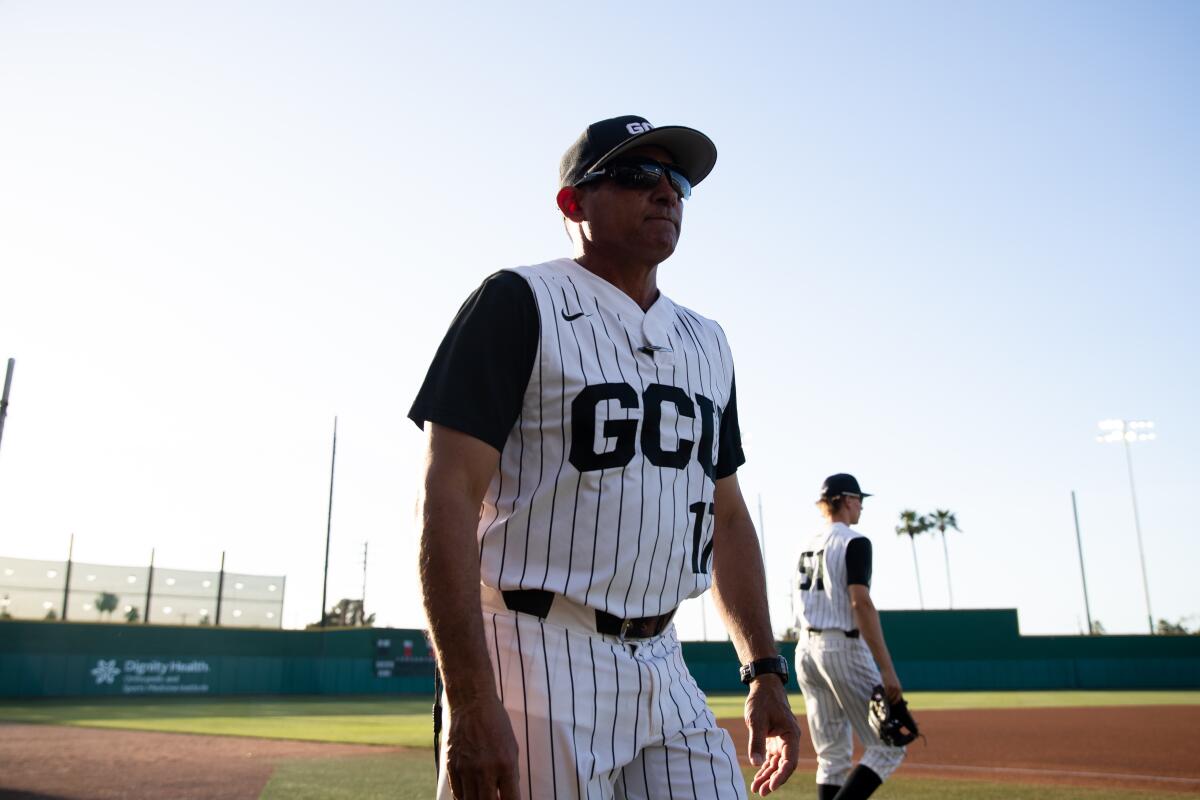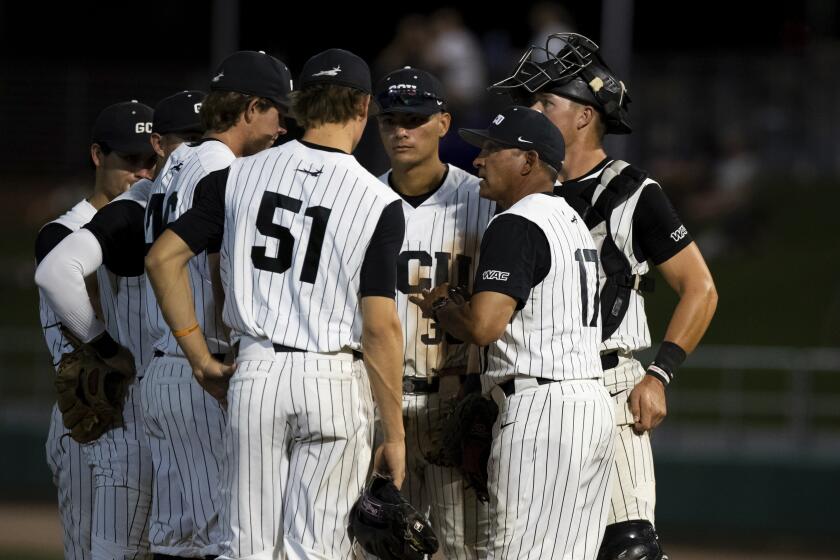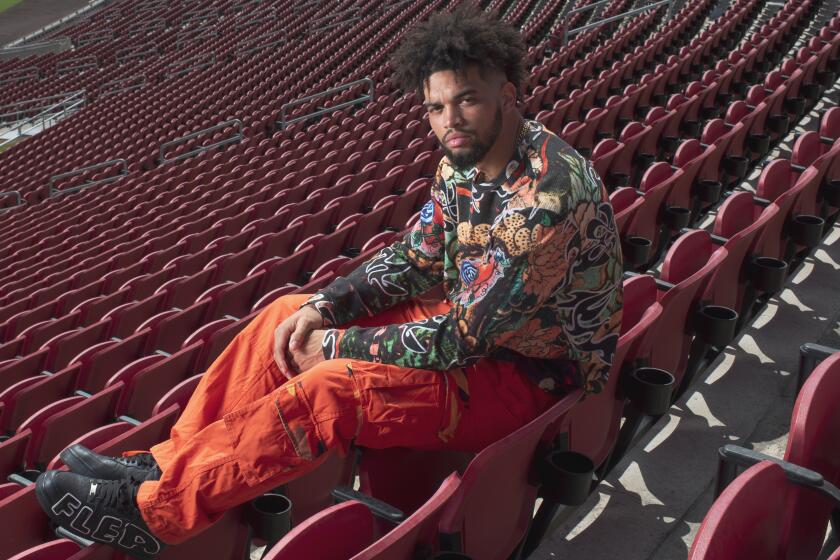New USC baseball coach Andy Stankiewicz sees ‘opportunity’ to turn around program

- Share via
At every step through his decades-long career in baseball, familiar doubts have followed Andy Stankiewicz.
As an undersized infielder, few expected him to make it past single A … or double A … or triple A. Yet he carved out a successful seven-year career in the big leagues.
As a first-time head college baseball coach, Stankiewicz had fewer than a dozen players left on his roster in 2012 when he took the reins at Grand Canyon, a onetime Division II baseball power stuck in a years-long skid. But he righted the ship almost immediately, guiding Grand Canyon through a transition to Division I, winning five conference titles and leading the Antelopes to back-to-back NCAA tournaments.
“I never believed any of [the doubters],” the new USC coach told The Times this week. “I believe in what I can do and I believe opportunities present themselves in life, and you just tackle them. You can’t make excuses. You have to find solutions.”
Now, as he takes the helm of college baseball’s most storied program, Stankiewicz faces perhaps the most daunting challenge of his career. Even if he doesn’t see it that way.
“What I see at USC is opportunity,” Stankiewicz said. “Obviously there are challenges, but I look at an opportunity for us to do something really special.”
USC hires Grand Canyon University’s Andy Stankiewicz, an Inglewood native and former MLB infielder, to rebuild the Trojans’ troubled baseball program.
It’s been a long time since USC’s baseball program has lived up to that level of promise. The Trojans have twice as many national titles as any other college baseball program, but have been to an NCAA regional just once in the last 17 years. Stankiewicz is USC’s sixth coach during that period, which yielded just two winning seasons but plenty of frustration and disappointment.
The Trojans’ last coach didn’t exactly leave the program in the best place either. Jason Gill was let go last month after a turbulent, three-year tenure that sparked two university investigations and caused widespread unrest among players.
In the wake of Gill’s firing, three regular contributors — catcher Garret Guillemette and pitchers Carson Lambert and Matt Keating — left the program. Six or seven others are mulling their options in the transfer portal while at least three more everyday position players — De’Andre Smith, Rhylan Thomas and Tyresse Turner — are waiting on possible opportunities to turn pro.
Convincing many of those players to stay is Stankiewicz’s first order of business. Convincing others outside the program to join via the transfer portal comes next. His arrival after the July 1 deadline to enter the portal, however, did the new coach no favors.
“It wasn’t as big of a mass exodus as some people think,” Stankiewicz said. “Most of them want to come back. Most of them came for a reason — to play baseball at USC and be a part of that tradition.”
The other issues Stankiewicz inherits have less clear-cut solutions.
There’s little he can do about USC’s difficult scholarship circumstances. College baseball programs are allotted 11.7 scholarships to dole out as partial assistance to players. At USC, where tuition and other costs can exceed $80,000 a year, the financial burden can be particularly onerous, limiting the pool of potential prospects.
Caleb Williams and his father share the strategies they have used to put the USC quarterback in the best position to win on and off the field.
Stankiewicz says he hopes USC’s new arrangement with Stay Doubted regarding name, image and likeness canhelp mitigate some of those concerns. He also noted the nearly $6,000 for academic achievement student-athletes will be eligible to earn from USC next fall in light of the Supreme Court’s recent Alston ruling.
He’s taken a similarly optimistic stance about USC’s stadium, which the coach confirmed will no longer be standing five years from now.
Concerns about the future of Dedeaux Field have loomed since the city of Los Angeles presented its vision for the 2028 Olympics. Those plans call for the field to be razed in order to build a new aquatics center ahead of the Games. But details about that demolition — and the subsequent fallout for USC baseball — remained unclear.
Stankiewicz was eager to set the record straight about the future of the Trojans stadium. While some had wondered if USC baseball would be displaced for several years by construction, Stankiewicz said he’s been assured the program will only be impacted from the fall of 2027 through the summer of 2028.
“That’s it. One year,” Stankiewicz said. “When it’s over, we’re going to be in a gorgeous, brand new Dedeaux.”
Stankiewicz, who grew up in Cerritos and played college ball at Pepperdine before playing seven years in the major leagues, has no trouble dreaming up a bright future for USC. It’s a challenge not every coach is willing to take on — top candidates Troy Tulowitzki and Andrew Checketts, in fact, took their names out of the running before USC turned to Stankiewicz, who also was a candidate for the job in 2019.
USC’s new coach has cleared similar hurdles before.
“I believe in this place,” Stankiewicz said. “I believe in myself. And I believe that this is where I’m supposed to be at this moment in my life.”
More to Read
Go beyond the scoreboard
Get the latest on L.A.'s teams in the daily Sports Report newsletter.
You may occasionally receive promotional content from the Los Angeles Times.









